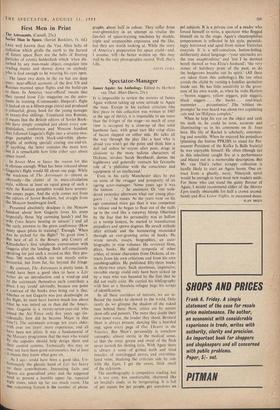Spectator–Manager
James Agate: An Anthology. Edited by Herbert van Thal. (Hart-Davis, 21s.) Ir is impossible to review the reviews of James Agate without taking up some attitude to Agate the man. Except in his earliest criticism (the first piece in this collection was written in 1907 at the age of thirty), it is impossible to see more than the fringes of the stage—so much of your view is occupied by a close-up of that solid hambone face, with great ears like crisp slides of bacon slapped on either side. He talks all the way through the play like a host who is afraid you won't get the point and think him a dull oaf unless he strains after puns, drags in allusions to the more tedious characters of Dickens, invokes Sarah Bernhardt, damns the highbrows and generally overacts his favourite role of 'a philistine with the conscience and equipment of an intellectual.' Even in his early Manchester days he put on some of the swagger and pomposity of an ageing actor-manager. 'Some years ago it was the fashion . . .,' he anounces. Or 'one won- dered yesterday afternoon what our young play- goers . . he muses. As the years went on his ego consumed more gas than it was competent to release and he began to float out of the stalls up to the roof like a runaway blimp. Obsehsed by the fear that his personality was as hollow as a turnip lantern, he started to manufacture prejudices and spawn dogmas. He struck attitude after attitude and the hammering resounded through an ever-growing series of books. He wrote novels, essays, biographies, an auto- biography in nine volumes. He reviewed films, plays, books. He edited symposia of other critics, of minor characters from Dickens, of ex- tracts from his own criticisms and from his own autobiographies. He published fifty-three books in thirty-two years. Such enormous, impressive, enviable energy could only have been stoked up by a man who was haunted by the fear that he did not really exist. He carried his bibliography with him as a Stateless refugee hugs his scraps of identification.
In all these corridors of mirrors, we see re- flected the masks he showed to the world. Only rarely do we glimpse the shadow of the naked man behind them. Now, critics are by nature show-offs and poseurs. The more they doubt their own inner voice, the louder they shout. Bernard Shaw is always present, dancing like a bearded imp, upon every page of Our Theatre in the Nineties. But Shaw's personality is somehow antiseptic, almost sterile •in the medical sense, so that the smut, grease and sweat of the flesh never tarnish his shining style. With Agate there is always a sense of gritted teeth and tired muscles, of overclogged nerves and, overstimu- lated veins. Studying the criticism side by side with the Egos, I get the sweet, thick smell of the sickroom.
The autobiography is compulsive reading, but it is too cosy, too comfortable, shuttered like an invalid's study, to be invigorating. It is full of pet names for pet people, pet anecdotes on
pei subjects. It is a private zoo of a reader who forced himself to write, a spectator who flogged himself on to the stage. Agate's claustrophiliac temperament is reflected in his style, painstak- ingly borrowed and aped from minor Victorian essayists. It is a self-conscious, button-holing, deliberately dated language—`your spectacles are the true anaphrodisiac' and 'lest I be deemed bereft thereof as was Eliza's husband'; 'the very stones of Salisbury prate of the past; so do the hedgerows breathe out its spirit.' (All these are taken from this anthology.) He too oaten avoids the cliche by turning a familiar quotation inside out. He has little sensitivity to the gross- ness of his own words, as when he visits Harlem =brown niggers, yellow niggers, pale niggers, black niggers . . . the bucks . . coal-black mammies . . . piccaninnies.' The 'wittiest im- promptu' he ever heard was about two copulating cats and 'an CEdipuss complex.' ' When he kept his eye on the object and sank his teeth in, he could be terse, accurate and illuminating—as in his comments on St. Joan here. His life of Rachel is scholarly, entertain- ing and sensible. When he enjoyed his prejudices (planning the button PPKIBS to stand for Per- manent President of the Kafka Is Balls Society) he was enjoyable himself. He often (though not in this selection) caught fire at a performance and blazed out in a memorable description. But Mr. van Thal's rather scrappy collection is hardly likely to start an Agate boom. One ex- tract from a ghastly, nasty, Ninetyish novel would be enough to turn most new readers aside. For those who can stand the gamy flavour of Agate, .I would recommend either of the Shorter Egos (easily obtainable for half a crown second- hand) and Red Letter Nights, in measured doses.
ALAN BRIEN






























 Previous page
Previous page